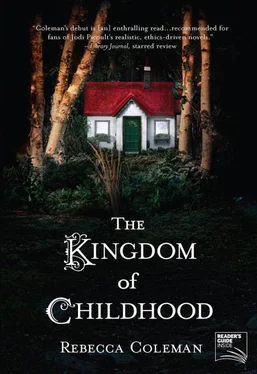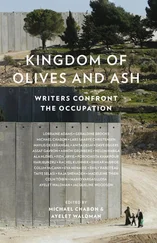“You never said anything about it,” I informed her.
“The school sent a flyer.”
“ Maggie. The school sends us a lot of things, most of them asking if we want season football tickets or if we’ll pay up five hundred dollars for a memorial plaque at the alumni center. You’re a sophomore now. I thought we were past those orientation events.”
She tightened her fleece jacket around her waist. “Well, I was just lonely, is all.”
I offered a tight smile. “How’s the dating scene?”
“Oh, Mom .”
I took her out to a pizza place just off campus, coercing her into filling up the tank while we were on the main drag. As soon as we were seated I understood why she had chosen the restaurant. The noise level was ungodly, and the tables were so close together that the constant jostling distracted from any focused conversation. This was a punishment for my asking the dating question, I was sure of it.
“So how are your biology classes going?” I shouted over the din.
She gave a bouncing nod, indicating things were as well as could be expected. “Good,” she replied. “The science courses are always good. I learned something really important over the past year.”
“What’s that?”
“That the stuff they taught us in science at Sylvania is utter bullshit.”
I peered harder at her. “What?”
“Utter bullshit,” she said, more loudly this time.
I pondered this—both the supposition and the fact that it was the first time I’d ever heard Maggie say anything so aggressive or profane. Finally I said, “That’s a pretty broad statement to make.”
“It’s true, though,” she replied stridently.
I nodded. After a moment of silence, I said, “Well, I’ve always thought Waldorf was most ideal for the younger grades.”
She gave a benign smile, her hands folded between her knees. The waiter plunked a pizza down between us. Then Maggie added, “Also, I’ve started going to church.”
“What?”
“You keep saying what, ” she pointed out. “Is your hearing okay?”
“What church?”
“The Baptist church on campus.”
“The Baptist church?”
“That’s the one.”
She had taken a slice of pizza and bitten off the end, but I couldn’t even think about eating. All around me was the clanging of silverware, the hum of conversation loud as road construction. In the kitchen, someone dropped a glass. Yellow light glared down, the sort that makes bugs die.
“Why?” I asked.
“It’s a nice group of people,” she said, her voice already growing hoarse from the strain of speaking. “Really uplifting. We go out on Sundays, tracting.”
“Tracting?”
“See, you can hear,” she observed, nodding. “You keep repeating back everything I say.”
“It’s because you’re speaking English,” I told her, “but not any English that makes any sense to me.”
“That’s because you’re narrow-minded.”
I reeled back against my chair. “Well, that’s the first time anyone’s ever lobbed that one at me.”
“Probably because the only people you associate with are the same as you,” she noted helpfully.
I took a slice of pizza and removed the greasy pepperoni before biting into it, to prevent myself from replying.
“The thing is,” Maggie continued, “I’ve realized I spent eighteen years sheltered under all this nonsense, learning all this stuff that doesn’t matter, from people who are generally hypocrites…and then out in the real world, once I stopped fighting it, I realized the world doesn’t explode if you admit fairies don’t exist and you can’t dance your way to a higher consciousness. It’s a matter of being logical.”
“I suppose that’s where the Baptist Church comes in.”
She raised her eyebrows slightly and strung a long piece of mozzarella into the air. “Redemption is logical,” she said. “Compared to a lot of that crap I digested, it’s practically Newton’s Law.”
I nodded. “So this is what rebellion looks like in one of my kids.”
“I’m not rebelling. This is who I’ve been all my life. I just didn’t have the language to talk about it, since all they speak at Sylvania is New Age gobbledygook. I never fit in at that stupid school and you know it. All I ever wanted was to be a regular person in a normal American family. One where I can go to a barbecue on the Fourth of July that isn’t full of people telling their stories about how they got out of the Vietnam draft.” She smiled and leaned in. “But you asked about the dating scene.”
“I did,” I said, overjoyed at the change of subject. “Anything new to report?”
“Just one small thing,” she told me. “I’ve taken a Purity Pledge.”
It was absurd, the degree to which Maggie was rebelling against her upbringing, but even as part of me laughed at it, part of me also mourned. I remembered looking down at her as she nursed at my breast, a tiny squashed creature clad in a white onesie and the pink hat Bobbie had crocheted for her, and gravely resolving in my heart that things would be different with her than they had been with my own mother. All through my childhood my mother had struggled for her sanity, and some years I observed she wasn’t struggling nearly hard enough. I picked at a thread tangled in the wool near the center of the hat and thought about what I had been in my mother’s life—a lumpy little defect in the middle of a regimentally ordered pattern—and that my children would never be made to feel that way. They were the center. They were the pattern. And despite it all, Maggie had grown to believe that I had placed the schema for childhood above the child herself. That I had strangled her with the safety net.
That night I went to bed in a melancholy mood, tucking the hotel pillow beneath my head and musing on my thoughts of my daughter. Quit being so emo, Zach would say, using a slang term that had stumped me before he explained it meant overly emotional. Most likely he was at my house tonight, visiting with his friends, drinking my Coke. If I were there I would be offering him a ride home, taking a quick detour to the lake as we had two nights before, when he had clutched a hand in my hair and laughed when it was over and said, oh my god, that felt amazing. I had beamed beneath the praise as though a professor had declared me his very best pupil. As we doubled back toward his house, the radio station briefed us on the latest news of the impeachment proceedings. I wonder if he regrets what he did with her, I said to Zach, and he replied, are you kidding, it’s the sport of kings.
I fell easily to sleep on the memory. My mind was glad to return to the midnight-dark interior of my car, the haste of unbuckling, the luxurious ease of his body submitting to my attention. He groaned, then laughed, then spoke, but his voice had changed; and so I looked up at him, his face pale amid the shadows, his short hair dirty blond, eyes a faceted blue. Even through the haze of dreaming I felt the shock of seeing his face, so unlike Zach’s, but it did nothing to deter me. When he reached for me he smelled of copper and soil, touching me with rough hands that did not spoil the pleasure that shivered through my belly, oblivious to the shame.
Zach stood in Judy’s kitchen, up to his elbows in sudsy water, felting balls of wool. The pastel spheres bobbed in the water: pink, blue and a minty green, all sized for a toddler’s hands. Assembly-line Waldorf crafts: his primary-school teacher would have groaned. But the bazaar was approaching. The toys had to be finished, to sell.
Zach squeezed water from the green ball, agitated it between his hands, soaked it again. Across from him Judy plunked a yellow ball onto a tray lined with a towel: her fifth.
Читать дальше












